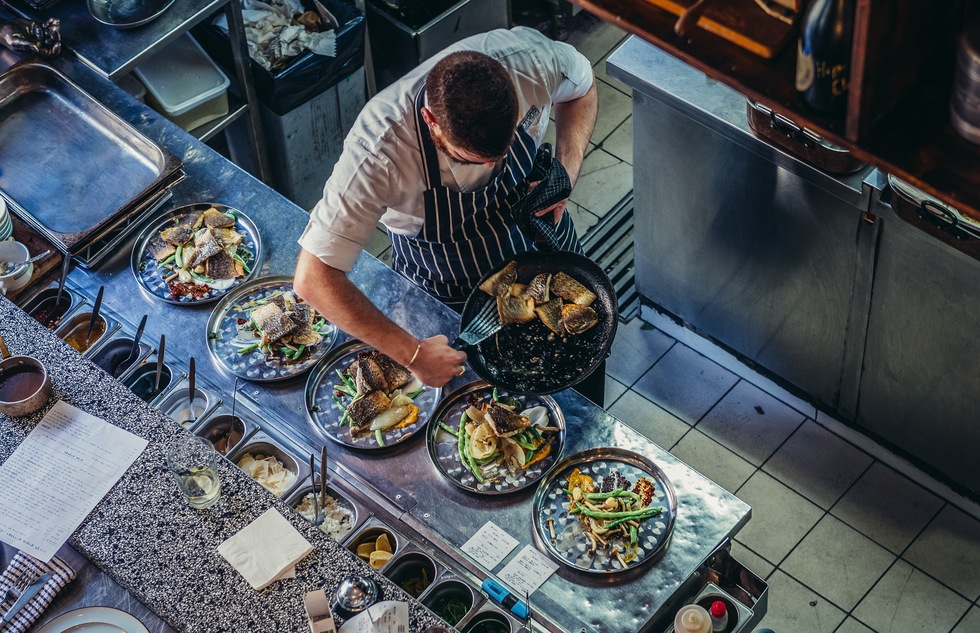Jerusalem has a huge selection of restaurants, dairy bars, lunch counters, snack shops, delicatessens, and cafes.
In the Old City and East Jerusalem, you’ll find mostly Middle Eastern cuisine, including numerous snack stands and inexpensive Arab eateries. Pork is prohibited for Muslims and Jews, but you will find pork, shellfish and alcohol (forbidden to Muslims) in East Jerusalem restaurants catering to tourists or Christian Jerusalemites. There are no kosher restaurants in East Jerusalem or in the Old City except in the Jewish Quarter. Most Old City restaurants open daily from late morning to 5 or 6pm.
In the Bazaars & near Damascus Gate--Although there are not many restaurants in this area, you can find plenty of Arabic pastry shops, simple eateries grilling whole chickens (which can be carved and packed in aluminum foil for takeout), and fresh juice bars. Wander from Damascus Gate along Suq Khan es-Zeit Street, which bears to the right at the fork.
The Jewish Quarter--This part of the Old City is home to a number of kosher fast-food spots on Jewish Quarter Road, where you can have a bowl of soup (usually made from powder), a slice of kosher pizza, or a bagel at a shop at the Seven Arches, near the Burnt House. On Jewish Quarter Road you’ll also find two (nonkosher) old-fashioned Arabic-style bread bakeries where you can buy warm, freshly baked pita and big sesame rolls, which are tasty to snack on as you explore the Old City. Ask the baker for a tiny, free package of zataar (local spices) to flavor the bread in Middle Eastern style.
In West Jerusalem, the dining scene is quite different. There’s not much authentic, ethnic dining, but West Jerusalem has an oversupply of French/Mediterranean restaurants overseen by talented, inventive chefs. These meals are not cheap, but almost all restaurants offer incredible business lunch specials from noon until 5 or 6pm that make them very affordable, at least at that time of day. You’ll find pedestrian streets that are wall-to-wall eateries, but some of the best dining choices are in quiet, slightly out-of-the-way streets and in old Ottoman-era mansions surrounded by walled gardens. Almost every restaurant or cafe has a security guard at its entrance (and many add a small security charge that’s worth the peace of mind).
Agrippas Street & Machane Yehuda--Walk a few blocks up Agrippas Street, and you’ll find yourself surrounded by no-frills restaurants and hole-in-the-wall spots serving generous portions of grilled meats, shashlik (chunks of meat on a skewer), and kabobs (ground meat on a skewer). Don’t be afraid to try semi-nameless holes-in-the-wall. Any place that survives in this competitive market area has to be good!
Sabbath Dining
Kosher restaurants usually close by 2 or 3pm on Friday for Shabbat and stay closed until sunset on Saturday.
Saturday night is big for dining out in Israel, but think twice before booking a top table at a kosher restaurant, because you won’t find restaurants at their best. Many kosher restaurants prepare food on Thursday, when they receive their last batch of fresh fish and vegetables before the weekend, so their staff won’t have to work on the Sabbath. If you’re going to splurge at a top restaurant, do it midweek.
Note: This information was accurate when it was published, but can change without notice. Please be sure to confirm all rates and details directly with the companies in question before planning your trip.









